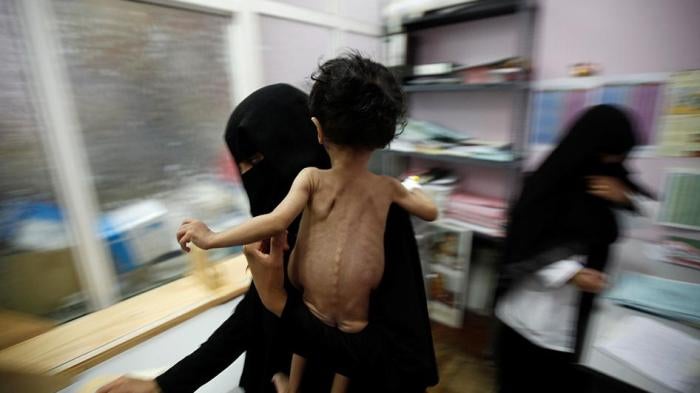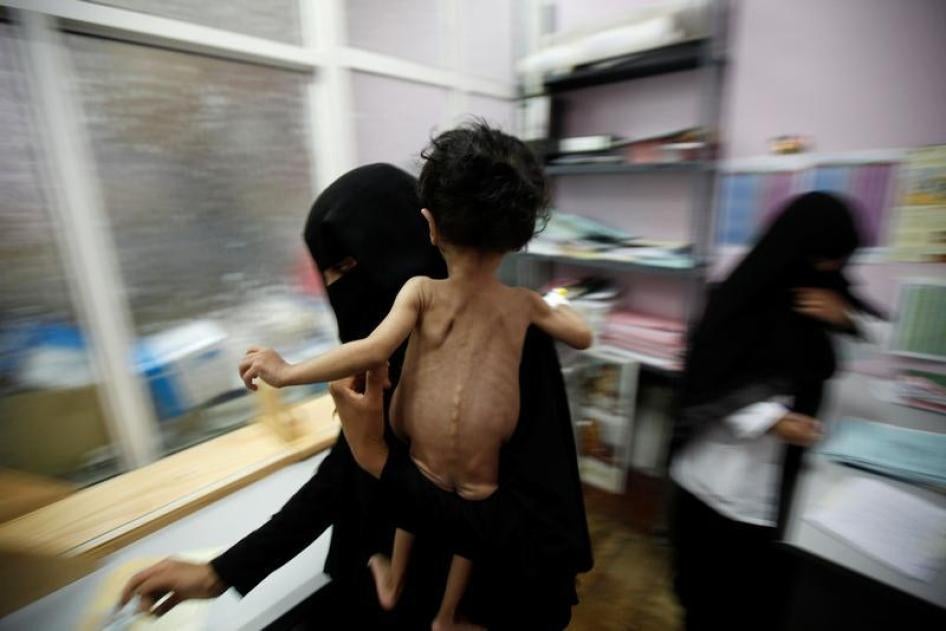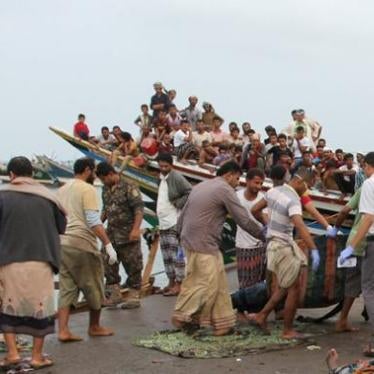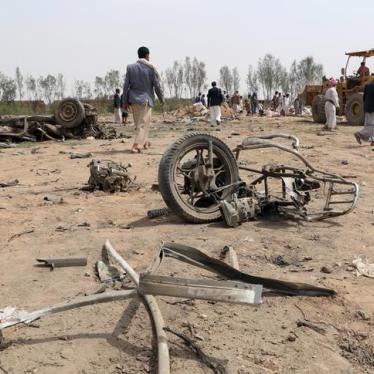I have seen hospitals that can’t turn on their generator. The labs can’t function, hospitals have to close at night, the cold chain [continuous refrigeration during transport and storage] for vaccines can’t function, and there are no air conditioners or even fans when the heat is unbearable for seriously ill patients.
A UN Panel of Experts reported in June that the Houthis had earned up to US$1.14 billion from fuel and oil distribution on the black market, and that fuel was “one of the main sources of revenue for the Houthis.” Houthi-Saleh forces apparently also use imported fuel for military purposes. However, preventing or excessively delaying fuel imports from reaching civilians is contributing to the collapse of the health system, a lack of access to uncontaminated water, and increased costs that make food and basic goods unaffordable for impoverished Yemenis. The substantial harm to civilians is disproportionate to any concrete and direct military advantage to the coalition, in violation of international humanitarian law, Human Rights Watch said.
The Houthi armed group and forces loyal to former Yemeni president Ali Abdullah Saleh have also blocked or confiscated aid intended for civilians and imposed onerous and unnecessary restrictions on aid workers and interfered with aid delivery. Aid groups have pulled out staff or ceased working in some areas due to these restrictions.
In Taizz, Yemen’s third largest city, a hospital official said that on April 17, Houthi-Saleh forces confiscated medical equipment from two trucks, including dialysis materials, that would have benefited at least 160 patients at his hospital. In February, the UN humanitarian chief’s relief convoy was denied entry into the city at a Houthi-Saleh checkpoint. On September 17, the UN Office of the High Commissioner for Human Rights (OHCHR) reported that Houthi-Saleh forces had enforced a “brutal” siege on the city of Taizz. Houthi-Saleh forces have repeatedly laid landmines that have impeded aid workers from reaching certain areas.
All states should support efforts at the UN Human Rights Council to create an independent international inquiry into abuses by all sides in Yemen, including unlawful restrictions on imports and denial of aid access, Human Rights Watch said. Houthi-Saleh authorities should immediately cease denying aid access to populations in need, including in Taizz, and threatening, intimidating, or harassing humanitarian staff whom the authorities should ensure can carry out their work unimpeded and impartially.
“The Saudi-led coalition’s cruel restrictions on fuel to Yemen, effectively shutting water taps and hospitals, have turned an impoverished country into a humanitarian disaster,” Van Esveld said. “Meanwhile, Houthi-Saleh forces have repeatedly blocked groups bringing vaccines into Yemen and kept aid from reaching people who desperately need it.”
Humanitarian Crisis in Yemen
The humanitarian situation in Yemen has significantly worsened in the past year. Even before the cholera crisis, the UN children’s fund (UNICEF) reported in December 2016 that one Yemeni child was dying from malnutrition or other preventable causes every 10 minutes. In July 2017, three UN humanitarian agencies found that “nearly 80 percent of children in Yemen need immediate humanitarian assistance.”
The Saudi-led coalition’s restrictions on fuel have greatly contributed to the humanitarian crisis. Because fuel is needed for agriculture and transportation, the shortages also increase food scarcity. The UN estimates Yemen’s fuel needs at 533,000 metric tons per month based on pre-conflict levels. So far in 2017 the monthly average of fuel imports is 163,000 metric tons, but this fell in June to only 88,000 metric tons. Fuel prices have increased by more than 50 percent since the conflict began, and up to tenfold in some areas, and cash-strapped hospitals often cannot afford fuel to run generators, a humanitarian official said.
The militarily contested city of Taizz, where Houthi-Saleh forces have repeatedly blocked aid, including medical supplies, from entering, has been particularly affected by a lack of humanitarian access and a shortfall in fuel and supplies. In 2017, Médecins Sans Frontières (Doctors Without Borders, or MSF) reported that:
Damaged hospitals and shortages of staff and essential supplies have resulted in the virtual collapse of Taizz’s health service, severely compromising people’s access to life-saving medical care. A crippled health system, combined with increasingly harsh living conditions, has prompted a decline in people’s health, with particularly acute consequences for vulnerable groups… such as pregnant women, newborn babies, and young children. Most families now live with little or no electricity and insufficient food and water.
Coalition Interference with Fuel Tankers
In response to the coalition’s blockade of Yemen, which began in March 2015, the United Nations established a Verification and Inspection Mechanism (UNVIM) in 2016 to inspect and issue clearances to ships bound for Houthi-Saleh-controlled ports. If cleared – a process the UN says should take only a few days, though some shipping company officials told Human Rights Watch it was often longer – ships proceed to a demarcated “coalition holding area” in the Red Sea, to wait for the coalition to inspect or give them permission to go to port. According to reports by the World Food Programme (WFP), the average waiting time for fuel tankers at Red Sea ports was eight days as of July 15, but had increased to 14 days by August 20.
In August, a shipping company representative told Human Rights Watch that Saudi authorities had been holding one of the company’s fuel tankers for more than five months after diverting it from Ras Isa. The ship received a cargo of oil in Djibouti, where UNVIM granted the ship permission to proceed to the “coalition holding area” in early April. The coalition boarded the ship to search for weapons. The ship was diverted to Jeddah, then to a second Saudi port, Yanbu, where it remained as of August 25.
Information obtained through a ship-tracking service corroborated this account, as did accounts from port officials interviewed separately by phone in Ras Isa and Hodeida. All the accounts said the ship received a clearance from UNVIM before the coalition diverted it.
The shipping company representative said neither the UN nor the Saudis had informed the company of the reason for the diversion or prolonged delay. He said that in the months that the ship has been forced to wait at the Saudi port, the coalition had prevented the crew from leaving the ship, even though some of them needed medical attention. “The cargo is all lost now because the coalition forced it to discharge the oil [at a Saudi port] and that cost about $20 million” without compensation, the representative said.
An official at another shipping company said three of his company’s tankers had regularly carried fuel to Yemen before the conflict and had continued to do so. The company’s ships are regularly cleared by UNVIM, but then subjected to coalition inspection and excessive delays when they try to deliver fuel to Hodeida, “costing us huge sums of money in lost time.”
Ultimately, rising shipping costs are passed on to consumers in Yemen, where nearly 40 percent of the population lived on less than US$2 per day even before the conflict. He said the coalition held one of the company’s ships in the holding area for 19 days in July:
We didn’t know what the problem was. The coalition navies have a number for commercial ships to contact them, but whenever we tried to call them and give them the permission number that we already obtained from UNVIM, they would reply that “The permission number is not clear. Wait for further instructions.
In four additional cases, shipping industry officials, UN agency logistics updates, and ship-tracking information indicate that fuel tankers appeared to have been delayed by the coalition for excessive periods. For example, the UN reported that a tanker with 11,485 metric tons of fuel oil was “expected” to arrive in Hodeida on June 10, but it was in the coalition holding area for 49 days, from June 11 until July 29. Because of the costs of the delay, an official at Hodeida port said:
The ship’s owners wanted the importer… to pay these expenses or else they won’t deliver the cargo. The importer bowed to the inevitable and paid all additional expenses. The ship arrived at the port, but then the importer filed for a court order to hold the ship at anchorage until its owners pay back his money.
Other recent instances include:
- A tanker carrying 4,105 metric tons of fuel oil was expected to arrive at Hodeida port on June 20, but instead was diverted to anchorage off Somalia, where it remained for 74 days, from June 10 until August 22. As of August 25, the tanker was off the coast of al-Mukalla, a government-controlled area of southeastern Yemen;
- A tanker carrying 12,035 metric tons of gasoline was expected in Hodeida on June 29, but was held in the coalition holding area for 28 days and did not arrive until July 26; and
- A tanker with 13,977 metric tons of gasoil was expected at Hodeida on July 9, but remained in the coalition holding area for 13 days, until July 21, before heading to the port.
The lack of clarity about whether a given ship might be inspected, denied, or seized by the coalition caused shipping companies to be “reluctant” to accept bookings for Hodeida port, the World Food Programme (WFP) reported. A shipping company manager told Human Rights Watch by phone that the coalition delayed a fuel tanker in the holding area for 28 days, from January 9 to February 5, and ultimately refused to allow it to proceed to port, “and provided absolutely no reason.” The ship had to discharge its fuel cargo in the United Arab Emirates (UAE), which did not cost the company but did cost the charterer about US$500,000. The same ship discharged cargo at Hodeida in mid-2016 with no problems, but because of the risk of being blocked again, the company no longer shipped there, he said.
The coalition has refused to provide ships any justification for refusing to allow some to berth, including ships that had received UN clearance. Saudi and other coalition members have also not reported on inspections they have carried out, according to a UN Panel report, which Human Rights Watch has observed, in violation of Security Council Resolution 2216, paragraph 17.
Coalition Closure of Ras Isa Marine Terminal
On May 30, 2017, the coalition notified the UN it had ordered the closure of Ras Isa the previous week, due to concerns Houthi-Saleh forces were using the revenues from imports at the terminal. The coalition-backed Yemeni government subsequently sent the port authorities a letter, dated June 5, which Human Rights Watch reviewed, that ordered the closure of Ras Isa purportedly to protect the “marine environment” from “pollution and oil leaks.” The WFP, which coordinates humanitarian logistics in Yemen, reported that “as of 14 June, vessels will no longer be granted clearance” for Ras Isa port, and would be diverted to Hodeida. The agency noted UNVIM had stopped issuing clearances for Ras Isa.
Nabil al-Mutahar, the general manager at Ras Isa, told Human Rights Watch the coalition had imposed “almost a full blockade” on the terminal since July. Already in early 2017, monthly diesel imports at Ras Isa had fallen from between 80,000 and 90,000 metric tons per month in 2015 to between 20,000 and 24,000 tons per month. He said, “In January 2016, we had six fuel tankers berthing at the terminal, but in January 2017, that number decreased to one. As far as I know, the coalition didn’t give a specific reason, and the fuel tankers didn’t violate any rules.”
Hodeida port is incapable of making up the lost diesel capacity from the closure of Ras Isa. Ras Isa was designed for diesel imports and had specialized diesel storage tanks with a greater capacity than the Hodeida port, al-Mutahar said. Yahia Sharaf Addin, the deputy chairman of Yemen Red Sea Ports Corporation, said that Hodeida cannot accommodate large fuel tankers with more than around 18,000 metric tons of fuel. He said that the fuel imports to Hodeida were limited – mostly around 40,000 to 50,000 tons of petroleum per month – and “can only cover the needs of Hodeida city and the local area.”
Coalition Delays of Ships Carrying Humanitarian Assistance
Humanitarian agencies often contract with shipping companies to bring in aid in standardized containers, which are transported on container ships and require special cranes for unloading. The coalition has repeatedly delayed container ships carrying humanitarian cargo.
On March 4, the coalition diverted a ship carrying 129 containers of vegetable oil and blankets for two UN humanitarian agencies, from Hodeida to the Saudi port of Jezan, and held it there for nearly three weeks after completing an inspection on March 13. UNVIM had already cleared the ship.
Save the Children, an international relief agency, said in March that coalition warships had blocked three of its medical supply shipments from reaching Hodeida in January and February, and rerouted the shipments to the southern port of Aden, which is controlled by the Yemeni government, delaying their delivery to beneficiaries by up to three months.
Overall, only two container vessels entered Hodeida in May, one in June, three in July, and two in August, according to information published on the Yemen Red Sea Ports Corporation website, which matched commercial ship-tracking information that Human Rights Watch reviewed.
In a statement to the UN in January, Saudi Arabia asserted that the coalition “has not refused to grant a permit to any shipment destined for a Yemeni port.” The Saudi statement alleged that Houthi-Saleh forces had “deliberately obstructed the entry of commercial vessels into ports under their control.” Human Rights Watch is not aware of such cases, although in November 2016, Houthi-Saleh authorities refused for weeks to clear deliveries of PlumpyNut, a high-calorie treatment for malnutrition, as well as other humanitarian goods at the Hodeida port. In the cases Human Rights Watch examined in 2017, shipping delays occurred in the coalition holding area, which is the coalition’s responsibility. However, from May 31 to June 4, the merchant vessel Mukaranas was blocked at Hodeida port from sailing back to Djibouti after it had discharged humanitarian cargo, the WFP reported.
In addition to restricting ships, the coalition has reduced the capacity for goods other than fuel at Hodeida port, through which 70 percent of all food imports enter Yemen, by refusing to allow imports of materials to repair or replace damaged infrastructure. Ras Isa terminal had been partly closed since coalition airstrikes damaged its Floating Storage and Offloading terminal in January 2016, Reuters reported.
The coalition has refused to allow the port to replace destroyed cranes or import spare parts needed to repair cranes that are “worn-out and in need of maintenance,” an official at the port said. In 2016, the US donated $3.9 million to the WFP to purchase four mobile cranes to unload dry bulk cargo – although not containers – from ships at Hodeida, but in January 2017 the coalition refused to allow a ship carrying the cranes to berth, humanitarian officials told Human Rights Watch.
The UN agency re-routed the cranes to a storage facility in the UAE, where they remain. Ships that berth at the port since then have needed to carry their own cranes, which take longer to unload cargo, increasing costs, a port official said. He told Human Rights Watch in late July that the coalition had also blocked a ship carrying six container chassis intended to move containers from the berth to the port’s containers-yard area from entering Hodeida port.
Two humanitarian officials said the coalition’s restrictions had made the Red Sea ports untenable and forced them to import aid via Aden, or to resort to cargo flights, which were up to five times more expensive. Importing aid through Aden can make it difficult for humanitarian agencies to transport assistance to some of Yemen’s major population centers, or areas in need of aid, as it requires crossing front lines and likely involves double taxation.
In September, Foreign Policy magazine reported that the US ambassador to the UN, Nikki Haley, had again approached Saudi Arabia about the cranes, but Saudi Arabia still refused to allow them to proceed to Hodeida.
Houthi-Saleh Obstruction of Aid
Houthi-Saleh forces have diverted humanitarian aid and imposed excessive requirements on humanitarian agencies before allowing aid distributions, the UN Panel said in its report. Some humanitarian organizations have been forced to close operations in areas under Houthi-Saleh control. In March 2017, MSF announced it was withdrawing from a hospital in Ibb governorate, which is controlled by Houthi-Saleh forces, due to its “inability to run activities according to MSF’s principles of independence and impartiality.” MSF said it had provided life-saving care to more than 41,000 patients in al-Thawra hospital’s emergency room since 2016.
Houthi-Saleh forces have repeatedly frustrated humanitarian efforts to provide vaccines, including those intended for children. In October 2016, Houthi-Saleh authorities repeatedly refused permission for a plane carrying vaccines to land in Sanaa, forcing it to return to its point of origin, despite prior negotiations with aid agencies and the Yemeni Health Ministry. “[The Houthi-Saleh authorities] want trauma kits, not vaccines, because those can be used for the war wounded,” an aid worker told Human Rights Watch at the time.
In November 2016, 11 armed Houthi-Saleh fighters raided Health Ministry buildings in Sanaa, attacked a guard, and took five vehicles, including two refrigerated trucks that humanitarian agencies had provided for vaccines requiring cold storage, which they wanted to use to transport dead bodies, a Health Ministry official told Human Rights Watch.
Houthi-Saleh forces have also denied or confiscated food aid. A humanitarian official described incidents in 2016 when Houthi-Saleh authorities delayed one truck delivery of food for several days “until the supplier gave them more than 20 bags of wheat for [their] war efforts,” and detained a staff member for two days when he refused to hand over soybeans from a second delivery for distribution to Houthi-Sale fighters.
In August 2017, another official in Sanaa said that the Houthis had repeatedly harassed, threatened, and detained staff involved in health and food projects. The official said that, “Whenever an organization receives funding and would like to start implementing an activity, the Houthis start bothering and blackmailing them, preventing them from working until they either give them the money or they give the money away to a local organization that belongs to them so the Houthis can take it easily.”
Yemeni staff at an aid agency with a food distribution project said that Houthi-Saleh authorities had repeatedly detained staff members for short periods, accused them of spying, and confiscated their belongings. “The main reason for stopping them was because they are working for an NGO,” he said. In February 2016, Houthi-Saleh authorities in Hodeida detained six Norwegian Refugee Council staff as well as a contracted driver for one week on suspicion that they were distributing supplies from the coalition. A Taizz-based activist said Houthi-Saleh forces had arrested two humanitarian volunteers at a checkpoint on the outskirts of the city in February and March, detaining the first one for a month and the second for more than one year.
Houthi-Saleh forces have also imposed onerous restrictions on internal movements of both international and national staff of humanitarian organizations in areas of Yemen they control, including, at times, refusing permission to travel to certain areas entirely or asking staff to seek official permission to travel to individual directorates.
The cumulative impact of Houthi-Saleh obstruction and interference with humanitarian assistance has significantly harmed the civilian population, Human Rights Watch said.
Houthi-Saleh Forces’ Obstruction of Aid into Taizz
Houthi-Saleh forces besieged Taizz from August 2015 until the coalition opened a road into the city from the south in March 2016. However, the route along secondary roads is “arduous,” and “access to Taizz remains extremely limited and residents continue to suffer,” the UN human rights office reported in September 2017.
The human rights office report said:
The prices of basic commodities in Taizz have skyrocketed, leaving civilians unable to afford basic essential items even if they are accessible or available. To access basic services such as health care, residents report that they have to traverse routes mined with explosives and are exposed to the constant risk of shelling, airstrikes and snipers. Residents also report that if they manage to reach locations where health care may be available, they often find that the facilities have been destroyed or damaged in the fighting, or that they lack even the most basic supplies. No public health care facilities in the city, and few private facilities, are fully functional.
Yemeni human rights activists said by phone in late August that Houthi-Saleh forces continued to restrict access to humanitarian aid and civilian goods into Taizz. They restricted aid at the al-Ghurab and al-Waze’aia entry points, which connect Taizz to the ports of Mokha and Hodeida, and also from four entry points to the north: Sabir al-Moadem, al-Aqroudh, al-Dimnah, and al-Houban.
In August, at least 18 people were killed during heavy floods while trying to take the only major route currently open to Taizz. It is under Yemeni government control, and requires lengthy, arduous travel, including on roads that Houthi-Saleh forces mined before they withdrew from the area.
Houthi-Saleh forces outside the city have demanded “large sums of money at security check points” from people wishing to enter the city or bring in goods, one activist said. The activist also said government-aligned forces had confiscated aid and civilian goods that entered the city and re-sold it for inflated prices.
High fuel costs in addition to other problems have forced many health facilities in the city to close, causing severe harm to patients with kidney failure who regularly need dialysis. One researcher said, “They have to travel outside of the city for treatment, and the journey to Aden is not easy at all” due to bad roads, and is expensive and lengthy:
It is very difficult for the sick and injured to travel to get medical assistance, but there is no alternative in Taizz because most hospitals are closed and the rest lack medicines and staff. The last humanitarian aid that was delivered to Taizz was almost four months ago.
International Humanitarian Law
All parties to the armed conflict in Yemen are bound by international humanitarian law, or the laws of war. Applicable law includes Common Article 3 to the Geneva Conventions of 1949, Protocol II to the Geneva Conventions, and customary international humanitarian law for a non-international armed conflict. The laws of war prohibit attacks against civilians that are deliberate, indiscriminate, or can be expected to cause harm disproportionate to the anticipated military gain at the time.
Under international humanitarian law, warring parties are obligated to grant humanitarian relief personnel freedom of movement, and protect them from attack and arbitrary detention. Confiscating goods necessary for the survival of the civilian population and blocking humanitarian aid are serious violations.
While a party may impose a blockade during an armed conflict, a blockade is unlawful if it has the sole purpose of starving the civilian population or denies the population goods indispensable for its survival. A blockade also violates the laws of war if it has a disproportionate impact on the civilian population, when the harm to civilians is, or may be expected to be, greater than the concrete and direct military advantage anticipated from the blockade.
A blockading party can only confiscate goods on board a neutral merchant vessel (or aircraft) if they are “contraband.” Contraband is defined as goods that “are ultimately destined for territory under the control of the enemy and which may be susceptible for use in armed conflict.” A blockading party must have published contraband lists, which may vary according to the particular circumstances of the armed conflict, but must be reasonably specific.










